K-State Current
K-State Current - July 27, 2022
K-State Current is a weekly news update for the Kansas Board of Regents to apprise the Regents on a few of the many successes and achievements made by K-State faculty, staff, and students.
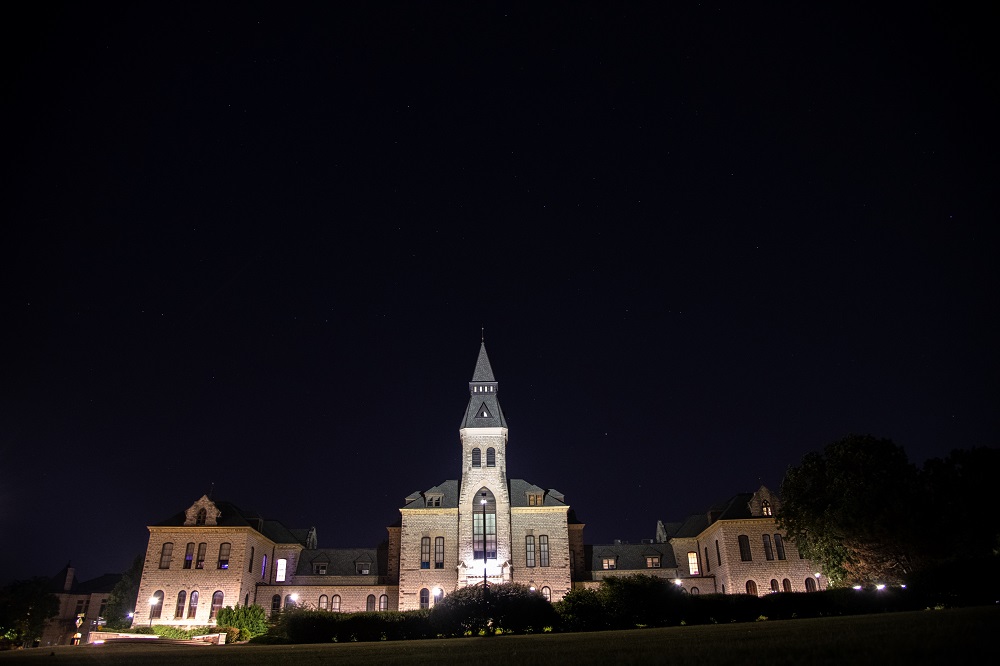
K-State News
NIH continues supporting K-State neuroscience research center with $11.2 million grant
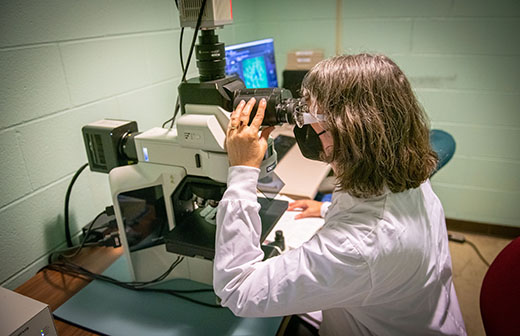
Kimberly Kirkpatrick, Kansas State University distinguished professor of psychological sciences and CNAP director, researches the neurobiology of timing and impulsivity.
The Cognitive and Neurobiological Approaches to Plasticity Center, or CNAP, at Kansas State University will continue important neuroscience-related research, thanks to a grant of $11.2 million from the National Institutes of Health.
The phase II grant is part of the Centers of Biomedical Research Excellence, or COBRE, program, and builds on phase I research, which started in July 2017 with the original $10.6 million COBRE grant that established CNAP.
The phase II grant will fund the next five years of CNAP research on plasticity, which is the way the brain changes over time. CNAP is a statewide effort led by K-State that also involves the University of Kansas and Wichita State University. At K-State, CNAP involves interdisciplinary researchers from the College of Arts and Sciences, the Carl R. Ice College of Engineering, the College of Health and Human Sciences, and the College of Veterinary Medicine.
"Receipt of the phase II COBRE award is a fantastic achievement for the CNAP center," said Kimberly Kirkpatrick, university distinguished professor of psychological sciences and CNAP director. "We will be using the funds to continue to support junior faculty development and make significant infrastructure upgrades to core facilities to support cutting-edge neuroscience techniques."
The new grant will help CNAP continue to reach three key goals:
• Promote neuroplasticity research by supporting junior faculty.
• Establish a critical mass of investigators in this area of research to compete for external funding.
• Support and improve research infrastructure for neuroplasticity research.
The phase II funding also will help with three new research projects; continue to expand upon three research core facilities, including the Behavioral Neuroscience Core, the Cognitive Neuroscience Core and the Neuroinformatics Core; operate the pilot grant program; and strengthen connections with other research centers and organizations in through scientific exchange networks.
The NIH National Institute of General Medical Sciences supports COBRE awards, which are part of the Institutional Development Award program that focuses on building research capacity in states with historically low levels of NIH funding. The COBRE program funds research in three separate, five-year phases.
Read more about researchers and projects involved in the Cognitive and Neurobiological Approaches to Plasticity Center.
Researchers successfully test first vaccine to prevent bovine anaplasmosis
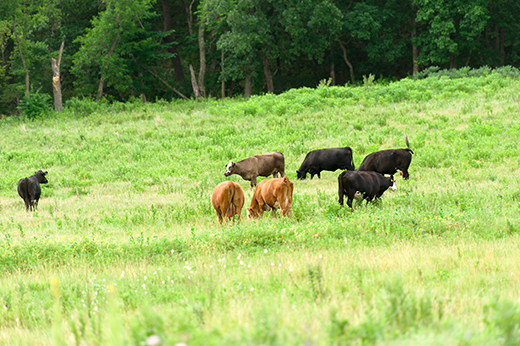
A recently published study on the urgent need for a bovine anaplasmosis vaccine involved researchers at Kansas State University's College of Veterinary Medicine.
A new study involving the College of Veterinary Medicine at Kansas State University is paving the way forward in controlling a devastating and costly cattle disease: bovine anaplasmosis.
The research, "Targeted mutagenesis in Anaplasma marginale to define virulence and vaccine development against bovine anaplasmosis," was published in May by scientists from K-States's diagnostic medicine and pathobiology department in PLOS Pathogens, a high-impact scientific journal. Co-authors include a group of scientists from St. George's University in the West Indies, Animal Diseases Research Unit of the U.S. Department of Agriculture in Pullman, Washington, and veterinary researchers from the anatomy and physiology, and clinical sciences departments at K-State.
"Our publication is unique and is the first in addressing the urgent need to develop a vaccine against an important tick-borne disease," said Roman Ganta, the study's senior/corresponding author and the principal investigator of the project. "Currently, there is no effective vaccine in the market, so this effort required innovative approaches in developing a vaccine."
Ganta, a university distinguished professor and director of the Center of Excellence for Vector-Borne Diseases in the College of Veterinary Medicine, said bovine anaplasmosis is a disease with major economic concerns not only in the United States, but around the world.
"Economic impact of the disease is in the billions of dollars of losses annually throughout the world," Ganta said. "The disease can spread rapidly by mechanical transmission routes, besides being transmitted by over 20 different tick species."
Ganta said anaplasmosis is the primary reason many producers feed cattle with the antibiotic supplement chlortetracycline, which has been proven not to be effective.
"We started a major research project in defining the disease throughout California and parts of Missouri and Kansas," Ganta said. "Independent of animals fed with antibiotic supplement, about 50-60% of all animals are positive for the disease. Farm practices, however, may make some difference in controlling the disease, but having a good vaccine is the best option for controlling the disease. We are the only research team working on it and developed the first protective vaccine."
"This is a truly outstanding paper that represents what I believe to be the greatest advance in anaplasmosis vaccine development in 50 years," said Hans Coetzee, study co-author, university distinguished professor and head of the K-State's anatomy and physiology department. "We are grateful for the opportunity to collaborate with Dr. Ganta's group on such an impactful project."
"Our work has been identified as 'very significant,' so we were able to receive support from an endowed fund managed by the California Cattlemen's Association," Ganta said. "In particular, this funding is by the Russell L. Rustici Rangeland and Cattle Research Endowment, which primarily supports faculty at the University of California, Davis. Due to our research's impact, the majority of the funding — 92% — came to us through a collaboration with a colleague at that university."
Ganta has been invited to share his research at the National Cattlemen's and Beef Association meeting in Reno later this month.
K-State Salina-led innovation competition rewards drone enthusiasts for their innovative ideas
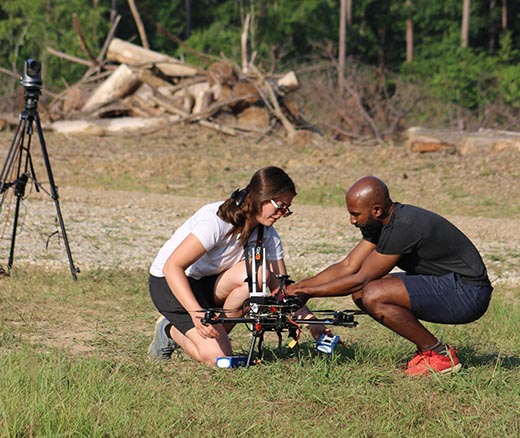
In conjunction with the National Institute of Standards and Technology Public Safety Communications Research Division, K-State Salina and Mississippi State University helped award prize money to drone enthusiasts for their innovative ideas to help first responders in emergency situations.
Kansas State University Salina Aerospace and Technology Campus played an integral role in an unmanned aircraft systems flight competition in Starkville, Mississippi, where prize money from federal innovation funding was awarded to drone teams for their emergency safety ideas.
The National Institute of Standards and Technology's Public Safety Communications Research Division, along with K-State Salina and Mississippi State University, hosted the First Responder UAS Triple Challenge, a prize competition for drone enthusiasts to build and operate unmanned aircraft that can better help first responders in emergency situations.
Prize money was awarded for each challenge in the multi-challenge competition.
For Challenge 3.1, winners were selected for improving drone image detection and enhanced navigation techniques to close the distance more quickly. Team AMAV from the University of Maryland won $40,000 for first place; Team ARCC from Pennsylvania State University won $20,000 for second place; and Team Aggie from North Carolina A&T State University/Purdue University won $10,000 for third place. The First Responders' Choice Award of $5,000 went to Team AMAV from the University of Maryland.
In Challenge 3.2, teams were awarded prize money for innovating a cost-effective, robust and easily deployable drone solution that delivers data files in a cellular-denied area. Winning first place and $40,000 was Team ARCC from Penn State; second place and $20,000 went to Team Mantech/FLYT Aerospace; and third place and $10,000 went to Team EpiSci. The First Responders' Choice Award and $5,000 was claimed by Team ARCC from Penn State.
The competition also awarded prize money to teams for developing an attack and countermeasure on open-source navigation or control software that may disrupt a drone's navigation for Challenge 3.3. The following winners were awarded $30,000 each: Team Mantech/FLYT Aerospace, Team ARCC from Penn State and Team CNA Corporation/RIIS LLC.
K-State Salina, along with Capital Consulting, will be involved with the National Institute of Standards and Technology's 2023 drone challenge: the First Responder UAS Indoor Challenge. In this competition, competitors will embark on indoor disaster response and search and rescue, finding solutions for first responders in those difficult scenarios.
Up to $685,000 in total prize money will be awarded to competitors as part of the First Responder UAS Indoor Challenge. For more information on the challenge and to register, visit firstresponderuaschallenge.org/.
College of Business hosts Summer Institute for high school students
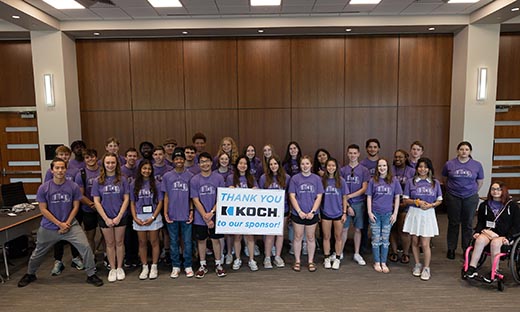
Participants of the inaugural Kansas State University College of Business Summer Institute. The institute, June 8-10, hosted 33 top high school students from five states who learned about the role of business in society and took part in an entrepreneurial challenge to win K-State scholarships.
Thirty-three rising high school students from five states participated in the Kansas State University College of Business' inaugural Summer Institute, June 8-10, to learn about the role of business in society and majors and options offered by the college.
The students, in grades 10-12, also applied what they learned in an entrepreneurial pitch challenge, competing for K-State scholarships. Members of the first-place winning team each earned a $1,000 scholarship, while second-place team members earned $750 scholarships and third-place team members earned $500 scholarships.
The institute featured faculty and staff representatives from across the college and was supported by the college's Center for Principled Business.
"This new summer institute was designed to serve as a springboard to give high school students a real college experience that helps foster a sense of independence, self-awareness and confidence as they look to select a university and a major," said Kevin Gwinner, Edgerley family dean of the college. "This taste of college life introduces them to the advantages of a business degree and inspires them to explore their full potential for success."
Participants experienced on-campus living and dining during their time at K-State and also interacted with several local business owners. Thanks to donors, including lead corporate partner Koch Industries, all educational, food and boarding costs were provided at no charge to the participants.
Student scholarship winners included:
Blake Bainum, Andover, honorable mention; Keegan Mispagel, Atchison, honorable mention; Abigail Harper, Auburn, $750 scholarship; Adriana Kiefer, Basehor, honorable mention; Karma Gonzalez, Bonner Springs, honorable mention.
From Greater Kansas City: Iman Brown, Cameron Campbell, DaQuon CheadleandLizbeth Flores Delmora, all from Kansas City and all honorable mention; Emma Rose Ritter, Leawood, honorable mention; Jackson Stewart, Lenexa, $1,000 scholarship; and George Giem, $1,000 scholarship, Jenya Jithesh, $500 scholarship, and Lexington Jones, $750 scholarship, all from Overland Park.
Owen Thompson, Lawrence, honorable mention.
From Manhattan: Siye Armstrong, $500 scholarship; Griffin Gergeni, honorable mention; Kamryn Gillispie, honorable mention; Meghan Krebs, $1,000 scholarship; Miles Price, $750 scholarship; and Zak Thompson, $500 scholarship.
Alexis Rutherford, Topeka, honorable mention; and Claire Waner, Wichita, honorable mention.
From out of state: Briana Hernandez, Berryville, Arkansas, honorable mention; Noah Hernandez, Springdale, Arkansas, $750 scholarship; Ethan Kirkham, Chesterton, Indiana, honorable mention; Madison Garrison, Sergeant Bluff, Iowa, $500 scholarship; Zabeth Bolte, Ashland, Missouri, honorable mention; Michael Saluzzi, Kansas City, Missouri, honorable mention; Sofi Armfield, Marionville, Missouri, $1,000 scholarship; Charlie Lewis, St. Louis, Missouri, $500 scholarship; Noah Pagel, Grand Island, Nebraska, $750 scholarship; and Faith Glinsman, Lincoln, Nebraska, honorable mention.
Visit the program’s webpage at cba.k-state.edu/success/new-students/summer-programs to see photos and learn more about this year’s institute. Registration for the 2023 Summer Institute will open in early spring 2023.